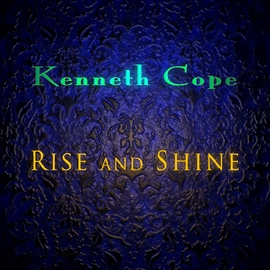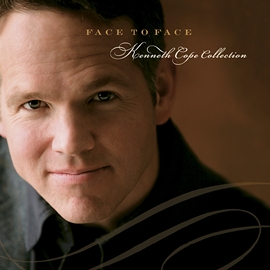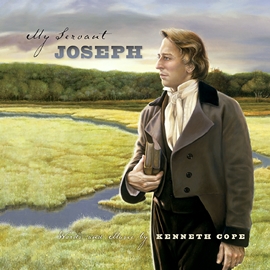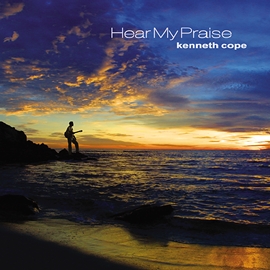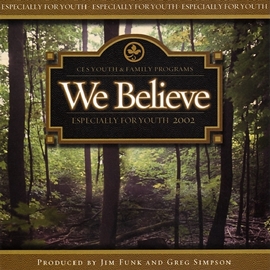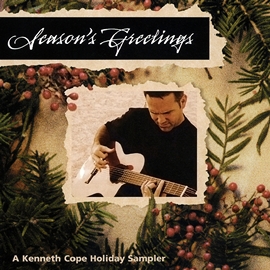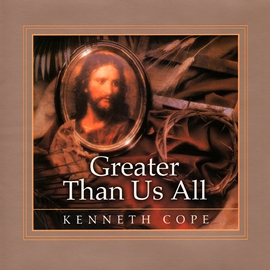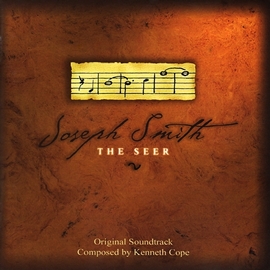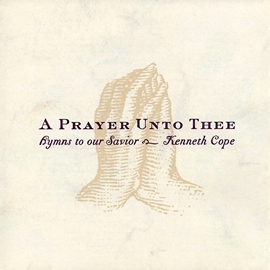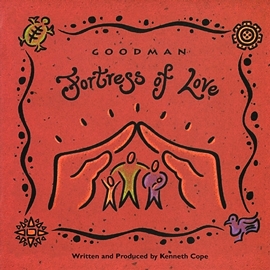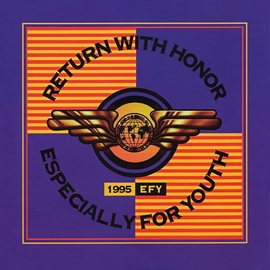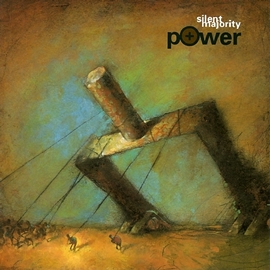 We all have things that inspire us…whether an insightful and deliciously written book, an artful and soul-awakening film, or powerfully moving, heart-stirring music. These things have definitely inspired me. Here, I wish to share some of the many books and other media that have enlightened and motivated me over the years. These have raised my level of thought. They’ve made me crave greater artistic competence. And they’ve each left their invaluable mark upon me. I feel they have combined together to help make me into who I am, so I can better fulfill what I was born to do. I am therefore excited to share them with you.
We all have things that inspire us…whether an insightful and deliciously written book, an artful and soul-awakening film, or powerfully moving, heart-stirring music. These things have definitely inspired me. Here, I wish to share some of the many books and other media that have enlightened and motivated me over the years. These have raised my level of thought. They’ve made me crave greater artistic competence. And they’ve each left their invaluable mark upon me. I feel they have combined together to help make me into who I am, so I can better fulfill what I was born to do. I am therefore excited to share them with you.
Note: I believe in gathering truth unto me from whatever source that might be available…and while some of the books that follow may contain bits of theology which I do not accept or agree with, I refuse to let that stop me from partaking of the abundance of good found within them.
Books
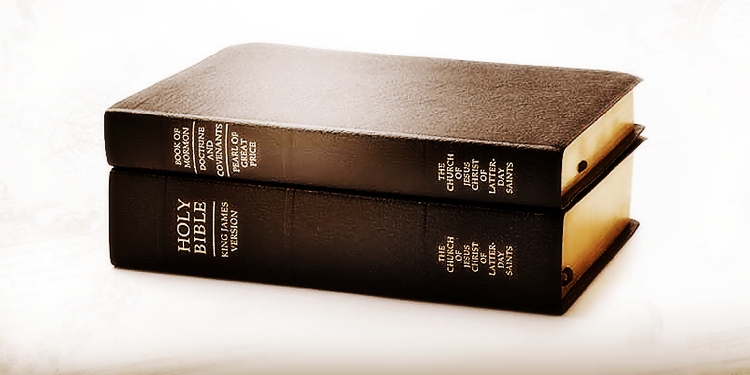 I have been afforded a great blessing. Since I have felt it paramount for me, in my songwriting, to create doctrinally accurate lyrics about our heavenly Father, Savior, and their teachings, it has been absolutely necessary for me to have spent much time over the years immersed in the Holy Scriptures. Like the writer who must plunge himself into all the details, shades and nuances of his subject in order to have credibility with his readers, or like the period artist who must do painstaking research so that her depiction of clothing, architecture, and paraphernalia feel authentic to the time, I have zealously sought to know and comprehend the word of God. At times I have found myself reading the scriptures thinking: “If I were going to create a song or movie of this story, how would I frame the events?” From this approach I have seen details in the scripture I had never seen before. At other times I have read through the Book of Mormon, or Four Gospels, or other scripture thinking about some specific topics…questions I had about doctrine…and as I read, phrases would jump off the page about those doctrines, clarifying and solidifying my understanding. Of course, the Holy Spirit was there to enlighten, assist, and direct me. I have fervently sought for this and God has been mercifully generous.
I have been afforded a great blessing. Since I have felt it paramount for me, in my songwriting, to create doctrinally accurate lyrics about our heavenly Father, Savior, and their teachings, it has been absolutely necessary for me to have spent much time over the years immersed in the Holy Scriptures. Like the writer who must plunge himself into all the details, shades and nuances of his subject in order to have credibility with his readers, or like the period artist who must do painstaking research so that her depiction of clothing, architecture, and paraphernalia feel authentic to the time, I have zealously sought to know and comprehend the word of God. At times I have found myself reading the scriptures thinking: “If I were going to create a song or movie of this story, how would I frame the events?” From this approach I have seen details in the scripture I had never seen before. At other times I have read through the Book of Mormon, or Four Gospels, or other scripture thinking about some specific topics…questions I had about doctrine…and as I read, phrases would jump off the page about those doctrines, clarifying and solidifying my understanding. Of course, the Holy Spirit was there to enlighten, assist, and direct me. I have fervently sought for this and God has been mercifully generous.
From Psalms 119: 105…
“Thy word is a lamp unto my feet, and a light unto my path.”
TEACHINGS OF THE PROPHET JOSEPH SMITH
Compiled by Joseph Fielding Smith
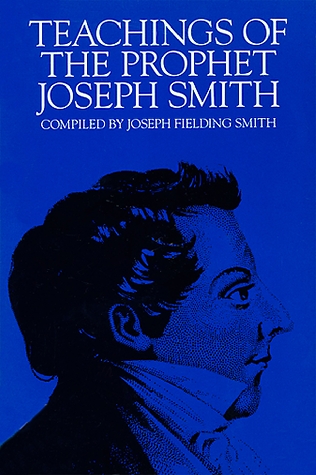 While all of Joseph’s recorded words are not in here, this compilation contains a multitude of amazing gems. I have read so many of these pages over and over again. Joseph was brilliant, inspired, and saw life in a very clear and uncluttered way. He spoke plainly and powerfully as one having authority from God. I have felt the voice of God’s pure doctrines so many times through the teachings of this mighty Prophet.
While all of Joseph’s recorded words are not in here, this compilation contains a multitude of amazing gems. I have read so many of these pages over and over again. Joseph was brilliant, inspired, and saw life in a very clear and uncluttered way. He spoke plainly and powerfully as one having authority from God. I have felt the voice of God’s pure doctrines so many times through the teachings of this mighty Prophet.
Quote from page 228:
“Don’t be limited in your views with regard to your neighbor’s virtue, but…be limited in the estimate of your own virtues, and not think yourselves more righteous than others; you must enlarge your souls towards each other, if you would do like Jesus, and carry your fellow-creatures to Abraham’s bosom….we must bear with each other’s failings, as an indulgent parent bears with the foibles of his children.
“…As you increase in innocence and virtue, as you increase in goodness, let your hearts expand, let them be enlarged towards others; you must be long-suffering, and bear with the faults and errors of mankind.
“How precious are the souls of men!…When a man is borne down with trouble, when he is perplexed with care and difficulty, if he can meet a smile instead of an argument or a murmur—if he can meet with mildness, it will calm down his soul and soothe his feelings; when the mind is going to despair, it needs a solace of affection and kindness.”
MERE CHRISTIANITY
C. S. Lewis
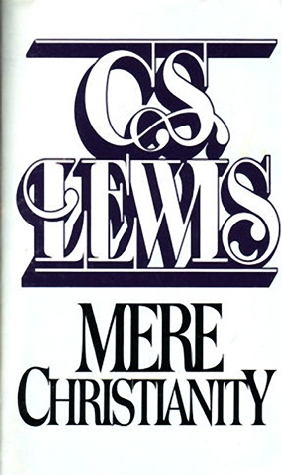 C. S. Lewis was a master thinker and writer of his day. But none of his works were more plainly laid out to the understanding than this marvelous book. The contents of the book was first given on radio, and then later published in three separate parts. Lewis’ desire here was to explain and defend to his unbelieving fellow men those beliefs that had been common to nearly all Christians. He “is the ideal persuader for the half-convinced, for the good man who would like to be a Christian but finds his intellect getting in the way” (Anthony Burgess, The New York Times Book Review). He has been oft quoted for decades. Even this book’s preface is filled with treasures!
C. S. Lewis was a master thinker and writer of his day. But none of his works were more plainly laid out to the understanding than this marvelous book. The contents of the book was first given on radio, and then later published in three separate parts. Lewis’ desire here was to explain and defend to his unbelieving fellow men those beliefs that had been common to nearly all Christians. He “is the ideal persuader for the half-convinced, for the good man who would like to be a Christian but finds his intellect getting in the way” (Anthony Burgess, The New York Times Book Review). He has been oft quoted for decades. Even this book’s preface is filled with treasures!
Quote from page 168:
“The terrible thing, the almost impossible thing, is to hand over your whole self—all your wishes and precautions—to Christ. But it is far easier than what we are all trying to do instead. For what we are trying to do is to remain what we call ‘ourselves,’ to keep personal happiness as our great aim in life, and yet at the same time be ‘good.’ We are all trying to let our mind and heart go their own way—centered on money or pleasure or ambition—and hoping, in spite of this, to behave honestly and chastely and humbly. And that is exactly what Christ warned us you could not do. As He said, a thistle cannot produce figs. If I am a field that contains nothing but grass-seed, I cannot produce wheat. Cutting the grass may keep it short: but I shall still produce grass and no wheat. If I want to produce wheat, the change must go deeper than the surface. I must be ploughed up and re-sown.”
THE JESUS I NEVER KNEW
Philip Yancey
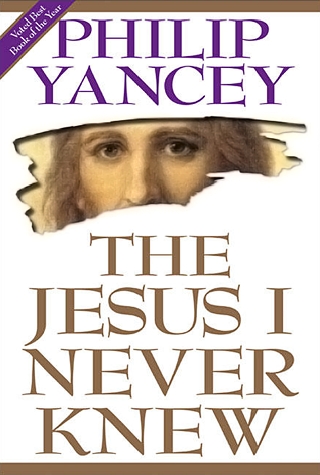 Philip Yancey has to be my favorite living Christian writer. His writing style is intelligent, emotionally inventive, and absolutely poetic. He is so well read, citing a vast array of powerful thinkers. This book is his taking a scrutinizing look at the Jesus of the Gospels, in Jesus’ Jewish context. Marvelous!
Philip Yancey has to be my favorite living Christian writer. His writing style is intelligent, emotionally inventive, and absolutely poetic. He is so well read, citing a vast array of powerful thinkers. This book is his taking a scrutinizing look at the Jesus of the Gospels, in Jesus’ Jewish context. Marvelous!
Quote from pages 36-37, 42:
“Before Jesus, almost no pagan author had used ‘humble’ as a compliment. Yet the events of Christmas point inescapably to what seems like an oxymoron: a humble God. The God who came to earth came not in a raging whirlwind nor in a devouring fire. Unimaginably, the Maker of all things shrank down, down, down so small as to become an ovum, a single fertilized egg barely visible to the naked eye, an egg that would divide and redivide until a fetus took shape, enlarging cell by cell inside a nervous teenager….
“The God who roared, who could order armies and empires about like pawns on a chessboard, this God emerged in Palestine as a baby who could not speak or eat solid food or control his bladder, who depended on a teenager for shelter, food, and love.
“…God’s visit to earth took place in an animal shelter with no attendants present and nowhere to lay the newborn king but a feed trough. Indeed, the event that divided history, and even our calendars, into two parts may have had more animal than human witnesses. A mule could have stepped on him. ‘How silently, how silently, the wondrous gift is given.’
“…‘The little Lord Jesus, no crying he makes,’ seems to me a sanitized version of what took place in Bethlehem. I imagine Jesus cried like any other baby the night he entered the world, a world that would give him much reason to cry as an adult.”
WHAT’S SO AMAZING ABOUT GRACE?
Philip Yancey
 This is my other favorite Philip Yancey book. In it he seeks to defend the idea that “There is nothing we can do to make God love us more. There is nothing we can do to make God love us less.” He so wonderfully explores all the nuances of grace…from God’s astounding love for us…to the fact that if we really loved Him back, we wouldn’t try to get away with anything contrary to His will. The world needs both of these loves and it is our calling as Christians to help the world find them.
This is my other favorite Philip Yancey book. In it he seeks to defend the idea that “There is nothing we can do to make God love us more. There is nothing we can do to make God love us less.” He so wonderfully explores all the nuances of grace…from God’s astounding love for us…to the fact that if we really loved Him back, we wouldn’t try to get away with anything contrary to His will. The world needs both of these loves and it is our calling as Christians to help the world find them.
Quote from pages 68-69:
“I know how I respond to rejection letters from magazine editors and to critical letters from readers….I know that my self-image at the end of the day depends largely on what kind of messages I have received from other people. Am I liked? Am I loved? I await the answers from my friends, my neighbors, my family—like a starving man, I await the answers.
“Occasionally, all too occasionally, I sense the truth of grace. There are times when I study the parables and grasp that they are about me. I am the sheep the shepherd has left the flock to find, the prodigal for whom the father scans the horizon, the servant whose debt has been forgiven. I am the beloved one of God.
“Not long ago I received in the mail a postcard from a friend that had on it only six words, ‘I am the one Jesus loves.’ I smiled when I saw the return address, for my strange friend excels at these pious slogans. When I called him, though, he told me the slogan came from the author and speaker Brennan Manning. At a seminar, Manning referred to Jesus’ closest friend on earth, the disciple name John, identified in the Gospels as ‘the one Jesus loved.’ Manning said, ‘If John were to be asked, “What is your primary identity in life?” he would not reply, “I am a disciple, and apostle, an evangelist, an author of one of the four Gospels,” but rather, “I am the one Jesus loves.”’
“What would it mean, I ask myself, if I too came to the place where I saw my primary identity in life as ‘the one Jesus loves’? How differently would I view myself at the end of a day?
“Sociologists have a theory of the looking-glass self: you become what the most important person in your life (wife, father, boss, etc.) thinks you are. How would my life change if I truly believed the Bible’s astounding words about Gods’ love for me, if I looked in the mirror and saw what God sees?
“Brennan Manning tells the story of an Irish priest who, on a walking tour of a rural parish, sees an old peasant kneeling by the side of the road, praying. Impressed, the priest says to the man, ‘You must be very close to God.’ The peasant looks up from his prayers, thinks a moment, and then smiles, ‘Yes, he’s very fond of me.’”
RETURN FROM TOMORROW
George G. Ritchie, with Elizabeth Sherrill
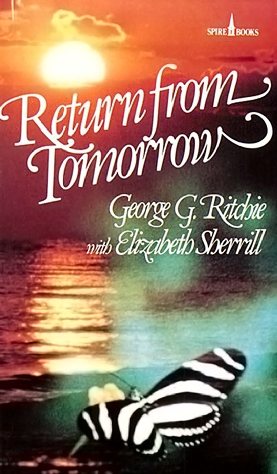 This book greatly expanded my vision of the meaning of life, as well as of death, the world beyond, and the amazing, glorious Savior who is busy in the wings working to help make each of us ready for God’s shining City! This is probably the most well-known book about someone’s Near Death Experience that was ever written. I love how George Ritchie describes the Savior and his encounter with Him!
This book greatly expanded my vision of the meaning of life, as well as of death, the world beyond, and the amazing, glorious Savior who is busy in the wings working to help make each of us ready for God’s shining City! This is probably the most well-known book about someone’s Near Death Experience that was ever written. I love how George Ritchie describes the Savior and his encounter with Him!
Quote from pages 72-73:
“…I was not aware of the precise moment when we left the surface of the earth….
“Up until this point I had had the impression that we were traveling…upon the earth itself….
“Now however, we seemed to have left the earth behind. I could no longer see it….
“And then I saw, infinitely far off, far too distant to be visible with any kind of sight I knew of…a city. A glowing, seemingly endless city, bright enough to be seen over all the unimaginable distance between. The brightness seemed to shine from the very walls and streets of this place, and from beings which I could now discern moving about within it. In fact, the city and everything in it seemed to be made of light, even as the [Son of God] at my side was made of light.
“At this time I had not yet read the Book of Revelation. I could only gape in awe at this faraway spectacle, wondering how bright each building, each inhabitant, must be to be seen over so many light-years of distance. Could these radiant beings, I wondered, amazed, be those who had indeed kept Jesus the focus of their lives? Was I seeing at last ones who had looked for Him in everything? Looked so well and so closely that they had been changed into His very likeness?…Even as I asked the question….we [began to draw away from this city with incredible speed.] The distance increased, the vision faded. Even as I cried out with loss, I knew that my imperfect sight could not now sustain more than an instant’s glimpse of this real, this ultimate heaven. [Jesus] had shown me all He could….
“Walls closed around us. Walls so narrow and box-like, that it was several seconds before I recognized the little hospital room we had left what seemed a lifetime ago.
“Jesus still stood beside me, otherwise consciousness could not have sustained the transition from infinite space to the dimensions of this cell-like room. The glorious city still sparkled…in my thoughts, beckoning, calling. With total indifference I noticed that there was a figure lying beneath the sheet on the bed which nearly filled the miniscule room.
“But incredibly Jesus was telling me that I belonged somehow with that sheeted form, that His purpose for me involved that lump-like thing as well. I was moving nearer to it. It was filling my field of vision, shutting off the Light. Desperately I cried out to Him not to leave me, to make me ready for that shining city….”
GOD’S SMUGGLER
Brother Andrew, with John and Elizabeth Sherrill
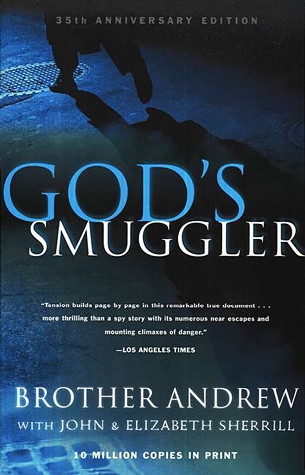 Miracles! This is a true story of God providing all things for a Dutch Christian man who felt called of Him to smuggle Bibles into communist Europe soon after World War II. “As a boy, Brother Andrew dreamed of being an undercover spy working behind enemy lines. As a man he found himself working undercover for God….Told it was impossible to minister behind the Iron Curtain, Andrew knew that nothing was too hard for God. Crossing ‘closed’ borders, he prayed, ‘Lord, in my luggage I have Scripture I want to take to Your children. When You were on earth, You made blind eyes see. Now, I pray, make seeing eyes blind. Do not let the guards see those things You do not want them to see.’ And they never did.” It’s a truly remarkable and suspense-filled account that the Los Angels Times described as “more thrilling than a spy story with its numerous near escapes and mounting climaxes of danger.” You’ll be amazed!
Miracles! This is a true story of God providing all things for a Dutch Christian man who felt called of Him to smuggle Bibles into communist Europe soon after World War II. “As a boy, Brother Andrew dreamed of being an undercover spy working behind enemy lines. As a man he found himself working undercover for God….Told it was impossible to minister behind the Iron Curtain, Andrew knew that nothing was too hard for God. Crossing ‘closed’ borders, he prayed, ‘Lord, in my luggage I have Scripture I want to take to Your children. When You were on earth, You made blind eyes see. Now, I pray, make seeing eyes blind. Do not let the guards see those things You do not want them to see.’ And they never did.” It’s a truly remarkable and suspense-filled account that the Los Angels Times described as “more thrilling than a spy story with its numerous near escapes and mounting climaxes of danger.” You’ll be amazed!
Quote from page 57:
“’What is it, Lord? What am I holding back? What am I using as an excuse for not serving You in whatever You want me to do?’
“And then, there by the canal, I finally had my answer. My ‘yes’ to God had always been a ‘yes, but.’ Yes, but I’m not educated. Yes, but I’m lame.
“With the next breath, I did say ‘Yes.’ I said it in a brand-new way, without qualification. ‘I’ll go, Lord,’ I said, ‘no matter whether it’s through the route of ordination, or through the Worldwide Evangelization Crusade program, or through working on at [the chocolate factory]. Whenever, wherever, however You want me, I’ll go. And I’ll begin this very minute. Lord, as I stand up from this place, and as I take my first step forward, will You consider that this is a step toward complete obedience to You? I’ll call it the Step of Yes.’”
Compiled by Mark McConkie
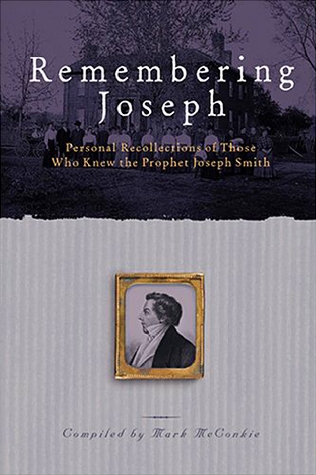 Thank you Mark McConkie for putting together a treasury of stories as told by those who knew and associated with the Prophet Joseph Smith.
Thank you Mark McConkie for putting together a treasury of stories as told by those who knew and associated with the Prophet Joseph Smith.
Quote from page 71, as told by Margarette Burgess:
“Joseph’s wife, sister Emma, had lost a young babe. My mother having twin baby girls, the Prophet came to see if she would let him have one of them. Of course it was rather against her feelings, but she finally consented for him to take one of them, providing he would bring it home each night. This he did punctually himself, and also came after it each morning. One evening he did not come with it at the usual time, and Mother went down to the mansion to see what was the matter, and there sat the Prophet with the baby wrapped up in a little silk quilt. He was trotting it on his knee, and singing to it to get it quiet before starting out, as it had been fretting. The child soon became quiet when my mother took it, and the Prophet came up home with her. Next morning when he came after the baby, Mother handed him Sarah, the other baby. They looked so much alike that strangers could not tell them apart; but as Mother passed him the other baby he shook his head and said, ‘This is not my little Mary.’ Then she took Mary from the cradle and gave her to him, and he smilingly carried her home with him. The baby Mary had a very mild disposition, while Sarah was quite cross and fretful, and by this my mother could distinguish them one from the other, though generally people could not tell them apart. But our Prophet soon knew which was the borrowed baby. After his wife became better in health he did not take our baby anymore, but often came in to caress her and play with her.”
Quote from pages 157-58, as told by John L. Smith:
“When [the Prophet was] playing in the yard of the old white mansion in Nauvoo, with Joseph and Frederick, two of his sons, a gentleman drove to the gate and asked if the Prophet Joseph Smith was at home; when he (the Prophet) sprang up from the grass plat, and, shaking the dust from his clothing, replied that he was. The gentleman then drove his one horse up to a tie post and left the lines lying loose, and got out and came into the house. When about halfway to the house Joseph said, ‘Mr., I think you would do well to tie your horse; he might get a scare and run away and break your carriage.’
“The gentleman replied, ‘I have driven that horse for some years and never tie him. I am a doctor and cannot afford to tie up at every place I call.’
“Joseph repeated, ‘You had better tie, all the same. Your horse might get a scare and run away.’
“The doctor replied, ‘No fear.’
“Joseph seemed quiet uneasy, and got up several times from his chair on the porch or stoop. Suddenly the horse started up the street and struck a wheel against a post and scattered the pieces for a block or more. The doctor sprang to his feet, and looking after the horse, cried out to Joseph, ‘I’ll be d—–d if you ain’t a prophet!’”
THE PURSUIT OF GOD
A. W. Tozer
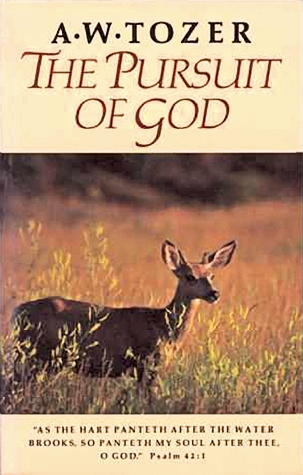 I love the passion and energy with which A. W. Tozer writes! There is a poetry and an uncompromising expectation in his words to live as a biblical Christian should, and follow our Lord’s words with exactness.
I love the passion and energy with which A. W. Tozer writes! There is a poetry and an uncompromising expectation in his words to live as a biblical Christian should, and follow our Lord’s words with exactness.
Quote from pages 27-30:
“…Abraham possessed….sheep, camels, herds, and goods of every sort. He had also his wife and his friends, and…his son Isaac safe by his side. He had everything, but he possessed nothing….The world said, ‘Abraham is rich,’ but the aged patriarch only smiled. He could not explain it, but he knew that he owned nothing, that his real treasures were inward and eternal.
“There can be no doubt that this possessive clinging to things is one of the most harmful habits in the life. Because it is natural, it is rarely recognized for the evil that it is. But its outworkings are tragic.
“We are often hindered from giving up our treasures to the Lord out of fear for their safety. This is especially true when those treasures are loved relatives and friends. But we need have no such fears. Our Lord came not to destroy but to save. Everything is safe which we commit to Him, and nothing is really safe which is not so committed.
“Our gifts and talents should also be turned over to Him. They should be recognized for what they are, God’s loan to us….We have no more right to claim credit for special abilities than for blue eyes or strong muscles. ‘For who maketh thee to differ from another? And what has thou that thou didst not receive?’ (1 Corinthians 4: 7)….
“The ancient curse will not go out painlessly; the tough, old miser within us will not lie down and die in obedience to our command. He must be torn out of our heart like a plant from the soil; he must be extracted in agony and blood like a tooth from the jaw. He must be expelled from our soul by violence, as Christ expelled the money changers from the temple. And we shall need to steel ourselves against his piteous begging….
“Father, I want to know Thee, but my cowardly heart fears to give up its toys. I cannot part with them without inward bleeding, and I do not try to hide from Thee the terror of the parting. I come trembling, but I do come. Please root from my heart all those things which I have cherished so long and which have become a very part of my living self, so that Thou mayest enter and dwell there without a rival….Then shall my heart have no need of the sun to shine in it, for Thyself wilt be the light of it, and there shall be no night there.”
ALL OF GRACE
C. H. Spurgeon
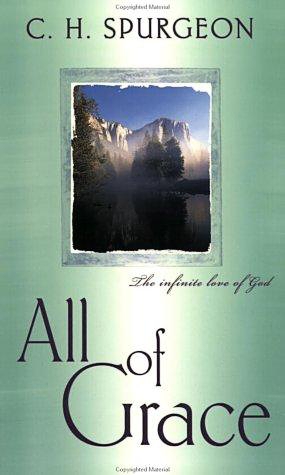 This wonderful jewel shatters the assumed notion that Christianity teaches that believing in Christ is enough to get to heaven…that repentance and change are not necessary. I love how Charles Spurgeon rebuffs this idea with such logical argument. As well, I feel lifted up by the tone of his message…there is a repeating, joyful invitation in Spurgeon’s words to all…His intention in writing this book is that many might be led to the Lord Jesus. He says: “It may be that the hour has come for you to enter that new life that is the beginning of heaven. ‘Faith comes by hearing’ (Romans 10: 17), and reading is a type of hearing. Faith may come to you while you are reading this book. Why not? O blessed Spirit of all grace, make it so!
This wonderful jewel shatters the assumed notion that Christianity teaches that believing in Christ is enough to get to heaven…that repentance and change are not necessary. I love how Charles Spurgeon rebuffs this idea with such logical argument. As well, I feel lifted up by the tone of his message…there is a repeating, joyful invitation in Spurgeon’s words to all…His intention in writing this book is that many might be led to the Lord Jesus. He says: “It may be that the hour has come for you to enter that new life that is the beginning of heaven. ‘Faith comes by hearing’ (Romans 10: 17), and reading is a type of hearing. Faith may come to you while you are reading this book. Why not? O blessed Spirit of all grace, make it so!
Quote from pages 124-26:
“Repentance must go with remission of sins. You will understand this if you give it some thought. It cannot be that pardon of sin would be given to an impenitent sinner. This would only confirm him in his evil ways and teach him to think little of evil….
“If we believe in the holiness of God, we cannot be forgiven if we continue to sin and refuse to repent of it….Surely, no rebel can expect the King to pardon his treason while he remains in open revolt. No one can be so foolish as to imagine that the Judge of all the earth will put away our sins if we refuse to put them away ourselves….
“To be forgiven is an immeasurable favor….[But] to be washed and yet to lie in the dirt, to be pronounced clean and yet to have the leprosy white on one’s brow, would be the worst mockery of mercy. What good is it to bring the man out of his grave if you leave him dead? Why lead him into the light if he is still blind?
“We thank God that He who forgives our iniquities also heals our diseases. He who washes us from the stains of the past also uplifts us from the foul ways of the present and keeps us from falling in the future.”
DARKNESS VISIBLE
William Styron
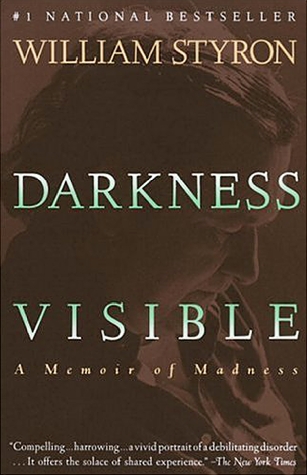 In 1985, William Styron, a Pulitzer Prize winner, found himself a victim of a crippling and almost suicidal depression. Miraculously, and with the help of his beloved Rose, he survived and made an eventual recovery. Darkness Visible is an essay of his torturous journey, wherein he conveys with such descriptive precision his ‘descent into madness.’ In it he calls the sickness of depression “the despair beyond despair”, and names self-loathing “depression’s premier badge.” This short book has been so important to me, because it has enlarged my mind and heart to a greater awareness and compassion for those who have suffered from this illness…some of whom are among my dearest friends.
In 1985, William Styron, a Pulitzer Prize winner, found himself a victim of a crippling and almost suicidal depression. Miraculously, and with the help of his beloved Rose, he survived and made an eventual recovery. Darkness Visible is an essay of his torturous journey, wherein he conveys with such descriptive precision his ‘descent into madness.’ In it he calls the sickness of depression “the despair beyond despair”, and names self-loathing “depression’s premier badge.” This short book has been so important to me, because it has enlarged my mind and heart to a greater awareness and compassion for those who have suffered from this illness…some of whom are among my dearest friends.
Quote from pages 16-18:
“…it was past four o’clock and my brain had begun to endure its familiar siege: panic and dislocation, and a sense that my thought processes were being engulfed by a toxic and unnameable tide that obliterated any enjoyable response to the living world….I was feeling in my mind a sensation close to, but indescribably different from, actual pain. This leads me to touch again on the elusive nature of such distress. That the word ‘indescribable’ should present itself is not fortuitous, since it has to be emphasized that if the pain were readily describable most of the countless sufferers from this ancient affliction would have been able to confidently depict for their friends and loved ones (even their physicians) some of the actual dimensions of their torment, and perhaps elicit a comprehension that has been generally lacking; such incomprehension has usually been due not to a failure of sympathy but to the basic inability of healthy people to imagine a form of torment so alien to everyday experience. For myself, the pain is most closely connected to drowning or suffocation—but even these images are off the mark….
“…one of the most unendurable aspects…was the inability to sleep. It had been my custom…to settle myself into a soothing nap in the late afternoon, but the disruption of normal sleep patterns is a notoriously devastating feature of depression; to the injurious sleeplessness with which I had been afflicted each night was added the insult of this afternoon insomnia…all the more horrendous because it struck during the hours of the most intense misery.”
THE USES OF ADVERSITY
Carlfred Broderick
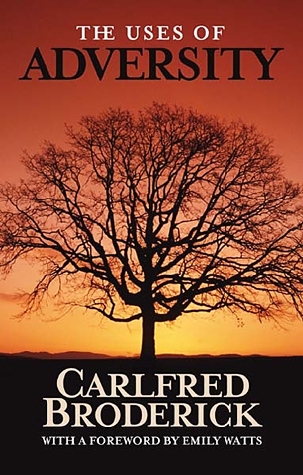 Using a variety of personal stories, Carlfred Broderick demonstrates that what we do with the pain that comes into our lives is part of what shapes us as human beings. And furthermore, he reiterates how, if we are humble before God, our very own experiences can teach us much about the nature of our heavenly Father. I love this short, powerfully beautiful book!
Using a variety of personal stories, Carlfred Broderick demonstrates that what we do with the pain that comes into our lives is part of what shapes us as human beings. And furthermore, he reiterates how, if we are humble before God, our very own experiences can teach us much about the nature of our heavenly Father. I love this short, powerfully beautiful book!
Quote from pages 6-7:
“…I do not want you to believe for one minute that if you keep all the commandments and live as close to the Lord as you can and do everything right…and pay your tithing and attend your meetings, accept calls from the bishop, and have a temple marriage, I do not want you to believe that bad things will not happen to you. And when that happens, I do not want you to say that God was not true. Or to say, ‘They promised me in Primary, they promised me [in Mutual], they promised me from the pulpit that if I were very, very good, I would be blessed. But…the missionary I’ve waited for and kept chaste for so we both could go to the temple turned out to be a flake,’ or far worse things than [that]. Sad things—children who are sick or developmentally handicapped, [spouses] who are not faithful, illnesses that can cripple, or violence, betrayals, hurts, deaths, losses—when those things happen, do not say God is not keeping his promises to me. The gospel of Jesus Christ is not insurance against pain. It is resource in event of pain, and when that pain comes (and it will come because we came her on earth to have pain among other things). When it comes, rejoice that you have resource to deal with your pain.”
Movies
Note: I have loved the cinema and the power of great film for years. There are so many movies which have touched me with an aspect of loveliness, filled me with compassion towards others, and motivated me to be a better son of God. Sadly, however, far too many of these are tainted with some reckless moral flaws, and so I hesitate to recommend them to you here so as not offend anyone in this regard. For example, the wonderful film, Awakenings, was life changing to me…but, it has one big bad word in it, which shockingly comes out of nowhere, and temporarily yanks me out of the powerfully introspective place where the film has brought me to that point. Gratefully, the rest of the film continues to lift and ennoble me. There is so much of goodness out in the world…a world which, like us, has some rather rough edges. May we earnestly seek after all that is heart and soul expanding without compromising the holiness of who we really are inside.
THE GOSPEL OF JOHN
(2003)
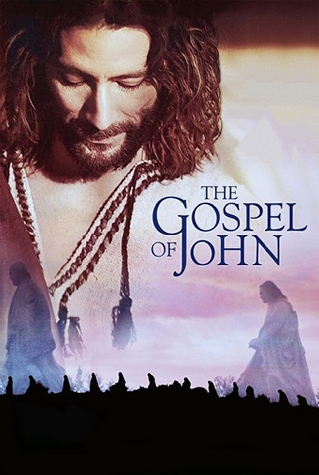 The Gospel of John, found in the New Testament, comes vividly to life in this three-hour epic motion picture. The sweeping, word for word adaptation of the American Bible Society’s Good News Translation Bible features a cast of over 2,500, including Henry Ian Cusick as Jesus, and Christopher Plummer as the Narrator. The film meticulously re-creates the Biblical era, from its temple and village life to its richly textured costume designs faithful to the period. Even its haunting musical score, composed by Jeff Danna, features sounds of ancient instruments. I love how Jesus is portrayed…full of divine power, but also teeming with energy, compassion, joy, a zest for life, and a humanity that I have found missing in most films created about our Lord. While we all have our own idea about how the Lord looks, His body type, etc., this film pleases me in its overall depiction of Jesus, as well as of so many of the individuals with whom He associated while He lived on the earth.
The Gospel of John, found in the New Testament, comes vividly to life in this three-hour epic motion picture. The sweeping, word for word adaptation of the American Bible Society’s Good News Translation Bible features a cast of over 2,500, including Henry Ian Cusick as Jesus, and Christopher Plummer as the Narrator. The film meticulously re-creates the Biblical era, from its temple and village life to its richly textured costume designs faithful to the period. Even its haunting musical score, composed by Jeff Danna, features sounds of ancient instruments. I love how Jesus is portrayed…full of divine power, but also teeming with energy, compassion, joy, a zest for life, and a humanity that I have found missing in most films created about our Lord. While we all have our own idea about how the Lord looks, His body type, etc., this film pleases me in its overall depiction of Jesus, as well as of so many of the individuals with whom He associated while He lived on the earth.
I have been moved to tears of adoration for my Lord so many times while watching this film.
Click HERE to see scenes from the movie accompanied by Jeff Danna’s amazing musical score.



